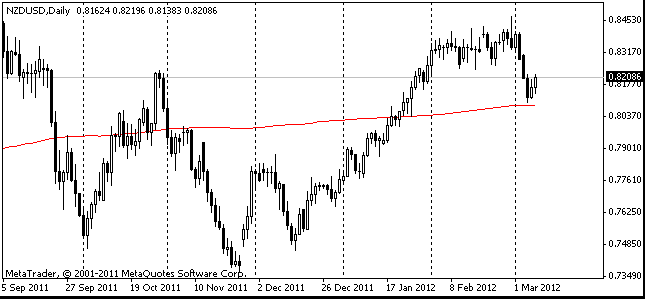EUR/usd
Not otherwise than to emphasize the advantageous position of the USA over Europe data on the European manufacturing activity proved to be poor. What is especially unpleasant is that these were final data which generally do not differ much from the preliminary estimate, but this is not the case now. The Italian PMI came in at the lowest level in the history, having lost at once 4.1 points from March to April. The April PMI figure for France was revised from 47.3 down to 46.9. The estimate for Germany was cut down to 46.2, the lowest level since July 2009. Such hail of news, coming in at a 5-minute interval, couldn't but harm the single currency. But that was not the end. The situation was aggravated by poor employment data from German Federal Labour Agency: the unemployment rate increased at once by 19K, which proved to be the sharpest growth since July 2009. That's right: the PMI and unemployment rates are now pointing to the fact that the current situation can be similar to that period, at least in the degree of deviation from the preceding vector of development. It's quite possible that having shrunk in the last quarter of 2011, the German economy will show a decline this quarter as well. If true, we will be able to speak about another recession (at least technically). Here we can rely only on the preceding income growth in Germany and on the willingness of its citizens to spend their savings when employment declines. The euro would have kept declining if the ADP hadn't released unexpectedly disappointing data on employment in the US private sector. After this publication the euro sales stopped for a while and EUR/USD stood still around 1.3121. However, there were few reasons to buy the euro for the dollar, that's why now trading is conducted at 1.3140. This day also promises to be eventful. The ECB's decision on the monetary policy and draghi's press-conference are high on the agenda. Let's see what the latter will say in regard to “mild recession” in the Euro-Zone.

GBP/USD
No, Britain doesn't give in. To be more exact, the PMI data keep pointing to the fairly good state of affairs in the construction sector. The April Construction PMI figure, published on Wednesday, remained high at 55.8 against 56.7. Probably, purchase managers are simply boasting in front of each other or the outer world, answering the main question of the research – “How is it going as compared to the preceding month?” – don't you think so? Because you know that the current high figures indicate that the affairs are getting better and better. After the February downfall the number of mortgage approvals slightly grew (from 49K to 49.9K), as reported by the BOE. It was good news as the markets had expected to see further decline. The net lending growth can't but be taken positively as well. However, being favourable for the banks and retail sales, it doesn't do any good with respect to the deleverage of the debt-burdened British households. The European issues pressed the pound, but not as much as the single currency. The sterling is now trading a bit below 1.62.

NZD/USD
Don't be disappointed by the growth of The New Zealand unemployment rate. Formally, this figure grew from 6.4% to 6.7% in the first quarter. Meanwhile, employment increased by 0.4% q/q and by 0.9% y/y. Thus, the unemployment growth occurred just due to the increase in the labour force. The Participation Rate went up from 68.2% to 68.8% over the first quarter of this year. The economy simply couldn't digest such an influx of employees, though it was creating jobs twice as fast as in the preceding half a year. Apparently, this fact somehow managed to stop the sales of the Kiwi, having prevented it from falling below 0.8 and bouncing up to 0.85.

gold
Gold has been trading flat for April and the most part of March. Now the quotes are still at these very levels, around 1647. Gold is losing the buying interest of investors. Generally speaking, the absence of growth in this metal is in itself equal to the loss, as if the funds, which bought Gold only for speculative purposes, start selling the metal, the things will be bad. This market is not as liquid as the money market of American Treasuries and therefore may suffer a serious price drop.
